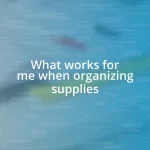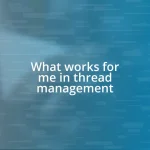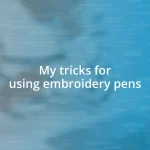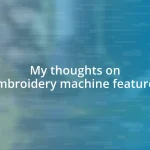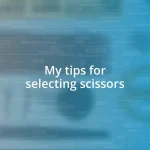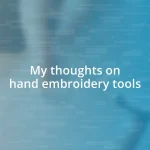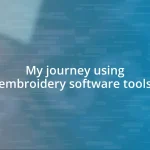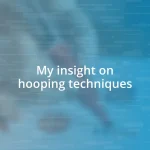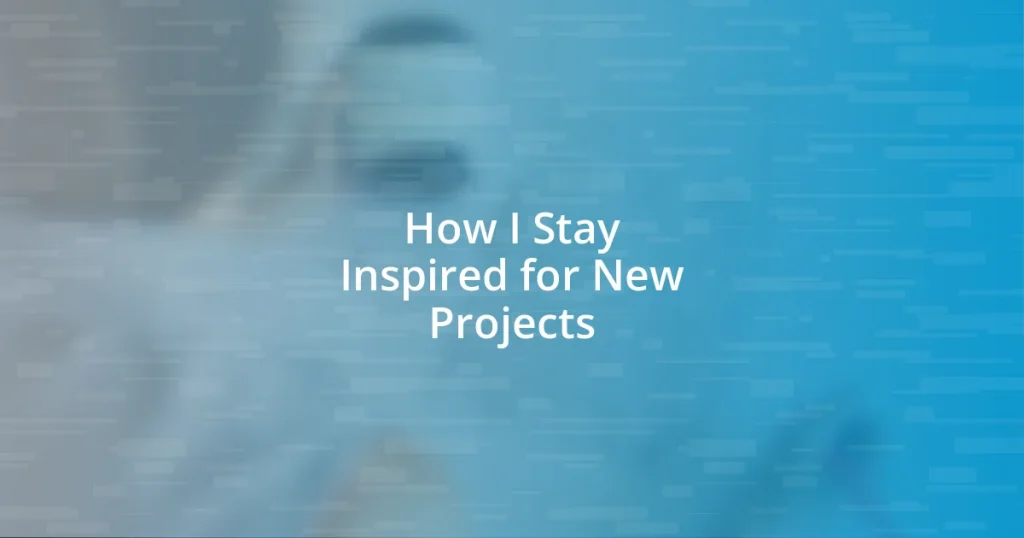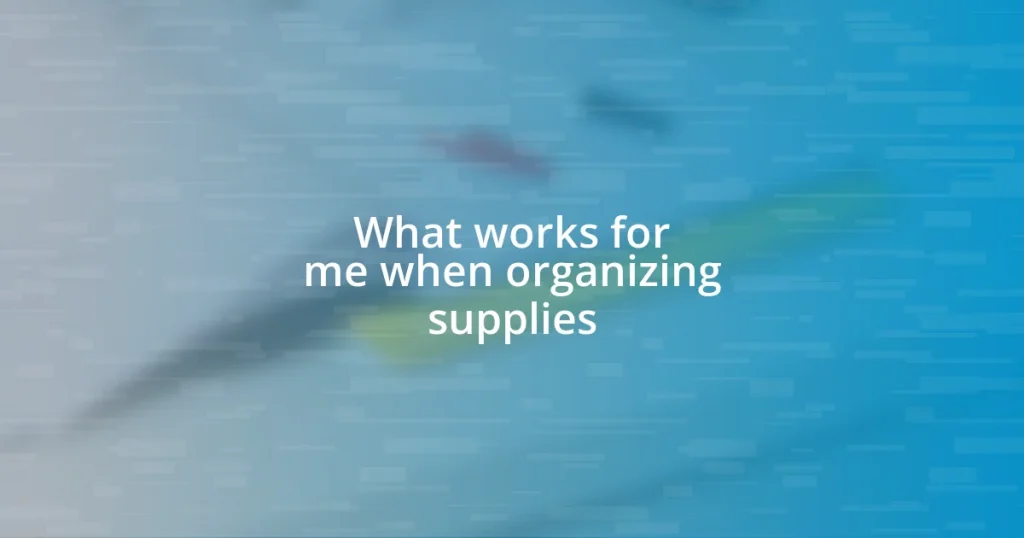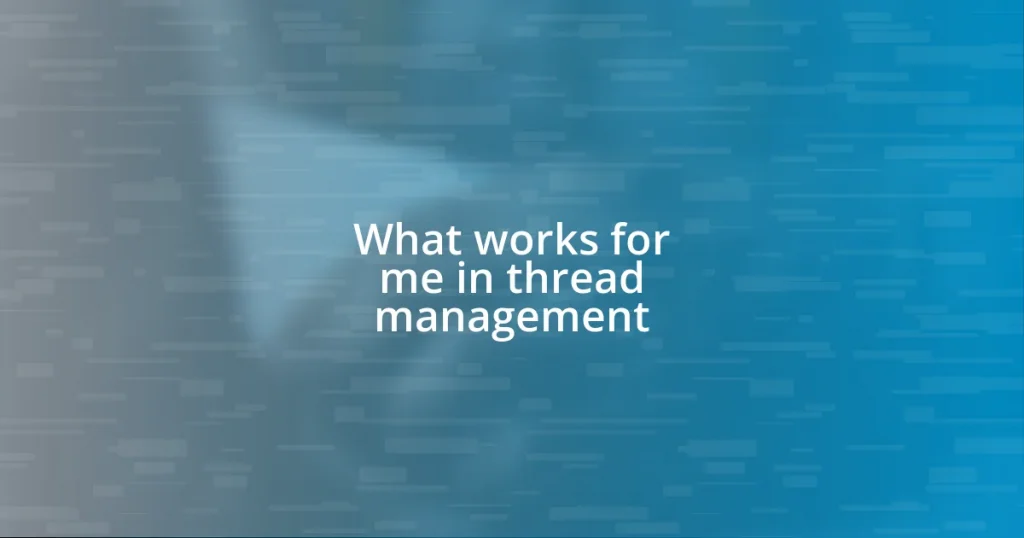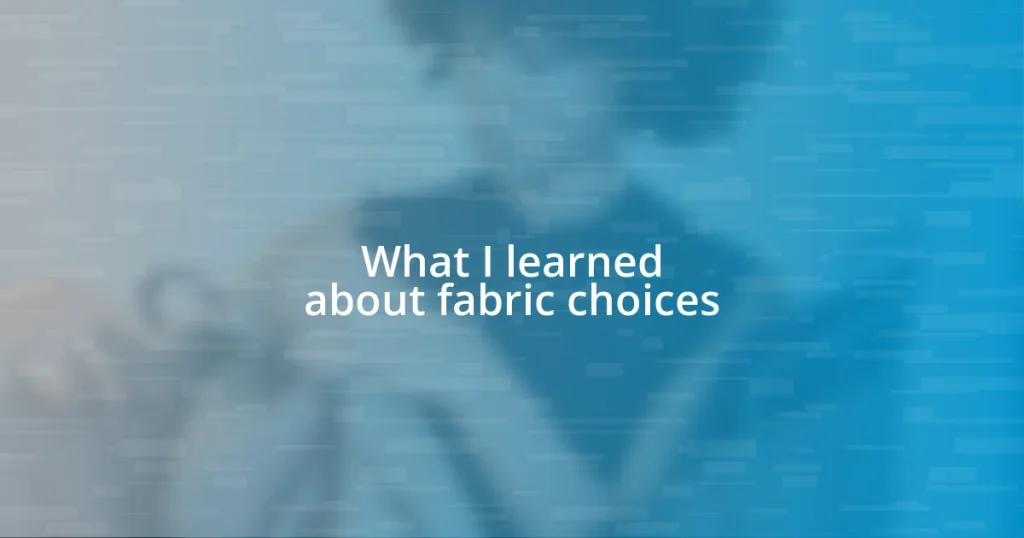Key takeaways:
- Identifying personal motivations, such as core values and emotions, is essential for sustaining creativity and guiding project choices.
- Exploring new interests and skills can lead to fresh perspectives and inspiration for ongoing projects.
- Reflecting on past projects and being open to feedback fosters growth and enhances the creative process through adaptability.
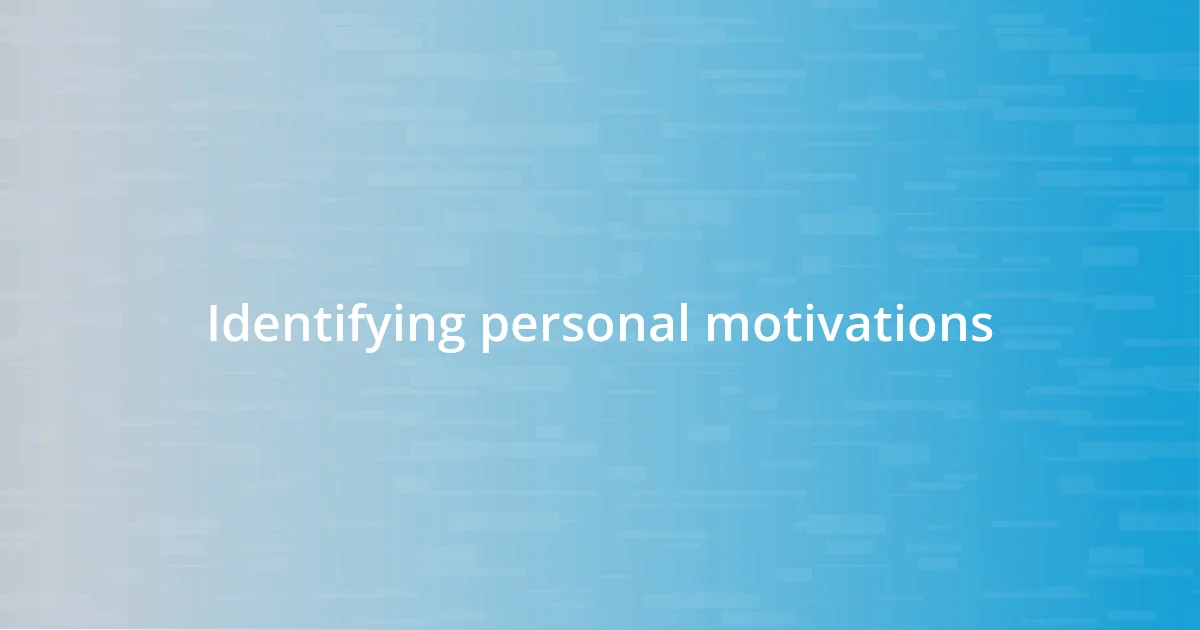
Identifying personal motivations
Understanding your personal motivations can be a transformative experience. I remember a time when I felt lost in a project, unsure why I even started. It was only when I took a step back to reflect on my core values and passions that I realized my desire to make a positive impact was my driving force. Have you taken the time to discover what truly fuels your creativity?
Sometimes, emotions play a huge role in our motivation. When I was working on a community art project, I found that the joy on the faces of the participants pushed me to keep going even when I faced challenges. That internal happiness became a motivation that was hard to ignore. What moments in your life have sparked that same kind of joy for you?
Identifying these motivations isn’t always straightforward, but it’s essential for sustained inspiration. I often ask myself, “What impact do I want to have?” This simple question guides my choices and keeps my projects aligned with my true self. Have you considered how your motivations shape your journey, not just the destination?
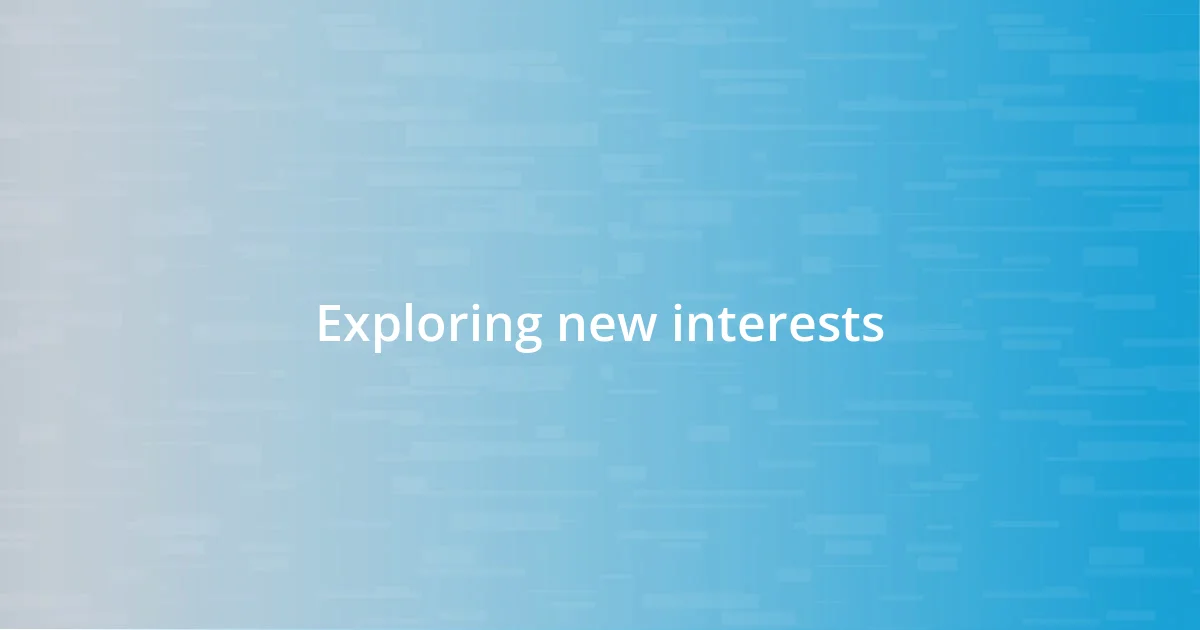
Exploring new interests
Exploring new interests can be exhilarating, like a breath of fresh air that reinvigorates your creativity. I clearly remember when I decided to take up pottery. What started as an impulsive class on a rainy afternoon turned into a profound passion. As I shaped the clay, I discovered a meditative quality that sparked new ideas for my projects. It reminded me that stepping outside my comfort zone not only enriches my skill set but also ignites inspiration in unexpected ways.
Engaging in new passions doesn’t just fill your toolbox with skills; it can significantly shift your perspective. I often find that each new interest brings with it a unique lens through which to view my work. For instance, trying my hand at photography helped me notice the intricate details in my surroundings, inspiring my later project themes. Here are some ideas to spark your exploration:
- Join a local workshop or class.
- Explore online platforms for courses in areas you’ve always found intriguing.
- Visit museums or galleries to immerse yourself in different art forms.
- Engage with friends or communities who share diverse interests.
- Set aside time to simply experiment with new hobbies, allowing for play without pressure.
By tapping into new interests, I consistently discover fresh insights that breathe life into my ongoing projects. What unique passions might you pursue to enhance your creative journey?
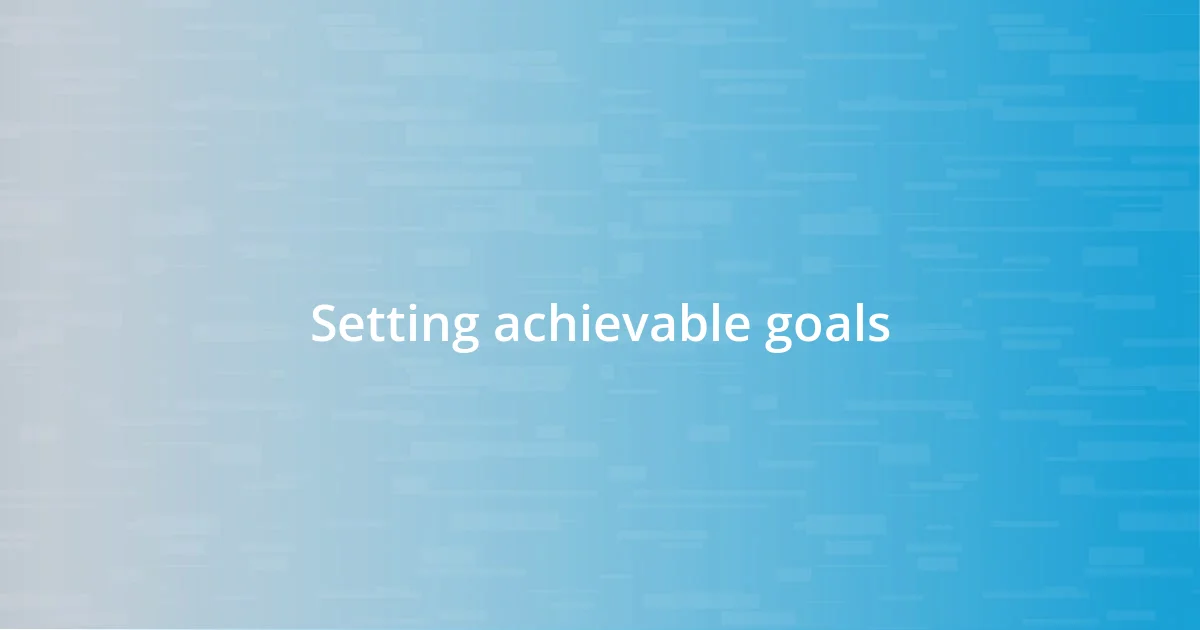
Setting achievable goals
Setting achievable goals is a crucial step in channeling your inspiration into tangible outcomes. I’ve found that breaking down larger aspirations into smaller, manageable targets makes the journey less overwhelming. For example, when I embarked on writing my first book, I didn’t focus on the entire manuscript at once; instead, I set a goal to write just one page a day. This approach not only kept me motivated but also fueled a sense of accomplishment with each completion. How do you break down your projects?
Creating realistic timelines is equally essential for maintaining motivation. During a recent project, I initially set overly ambitious deadlines that led to unnecessary stress. After reassessing, I revised my timeline to include breaks and milestones. To my surprise, this thoughtful planning made the process enjoyable when I celebrated small victories along the way. Can you recall moments when adjusting your timeline changed your project experience for the better?
Finally, it’s beneficial to regularly review and adjust your goals. I learned this after completing a community initiative where my initial objectives were too rigid. I embraced flexibility by checking in on my progress every few weeks, allowing me to pivot as necessary. This adaptability transformed challenges into opportunities, reinforcing my belief that achieving goals is a dynamic process rather than a fixed destination. What adjustments do you think might help you on your journey?
| Goal-Setting Strategy | Description |
|---|---|
| Break Down Goals | Divide large goals into smaller, achievable steps to reduce overwhelm. |
| Set Realistic Timelines | Create timelines that include breaks and milestones for sustainable progress. |
| Regularly Review Goals | Assess and adjust goals as needed to stay aligned with your project’s evolving nature. |
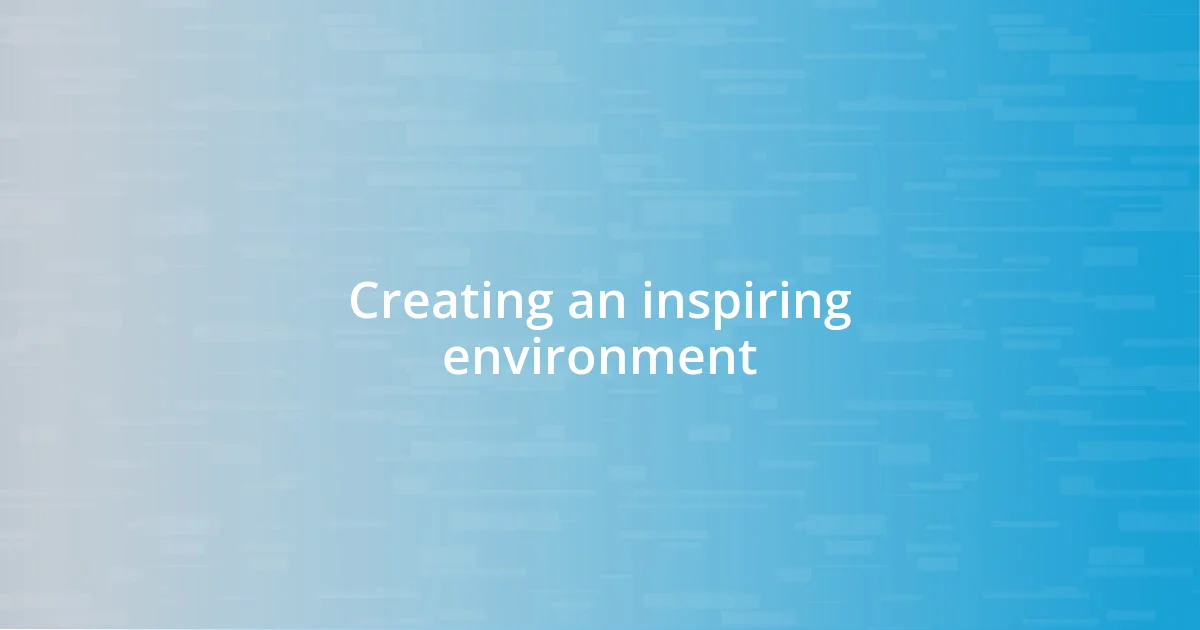
Creating an inspiring environment
Creating an inspiring environment is essential for fueling creativity. I remember transforming my workspace into a decluttered oasis filled with plants and art that resonated with me. It’s surprising how a simple change can elevate your mood and spark ideas. Have you ever thought about how your surroundings impact your creative flow?
Lighting also plays a huge role in setting the right vibe. I’ve noticed that working under soft, natural light fosters a sense of calm that encourages deep thinking. One afternoon, when I switched to using a warm desk lamp, I found myself getting lost in my writing for hours. Do you have places where certain lighting instantly boosts your creativity?
Lastly, surrounding yourself with inspirational items can act as a daily reminder of your vision. I often display my favorite quotes and photographs from my travels where I can see them. These little touches serve as both motivation and connection to my passions. What personal items inspire you to keep pushing forward?
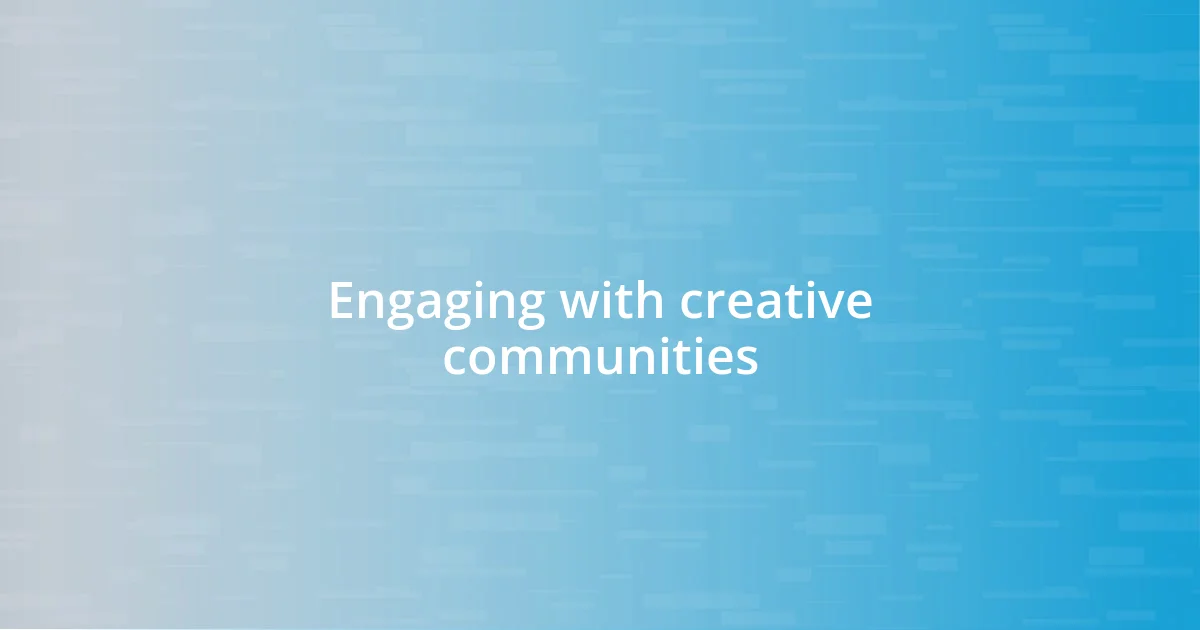
Engaging with creative communities
Engaging with creative communities has been one of my greatest sources of inspiration. I remember the first time I attended a local art meetup; it was electrifying to be in a room filled with passionate individuals sharing their ideas. The exchange of thoughts not only ignited my creative spark but also reminded me that collaboration can amplify inspiration. Have you ever experienced that buzz when connecting with like-minded people?
Online forums and social media groups can also serve as invaluable resources. I’ve participated in various creative groups on platforms like Facebook and Reddit. Each interaction often leads me to new techniques and perspectives that I hadn’t considered before. It’s fascinating how a simple comment can shift your entire outlook on a project. What insights have you gained from your online creative circles?
Moreover, participating in workshops or collaborative projects allows you to learn from others and share your knowledge. I once joined a storytelling workshop that not only refined my writing skills but also introduced me to fellow writers with diverse styles. The supportive environment made it easy to experiment and grow. Isn’t it amazing how stepping into these communal spaces can push you beyond your comfort zone?
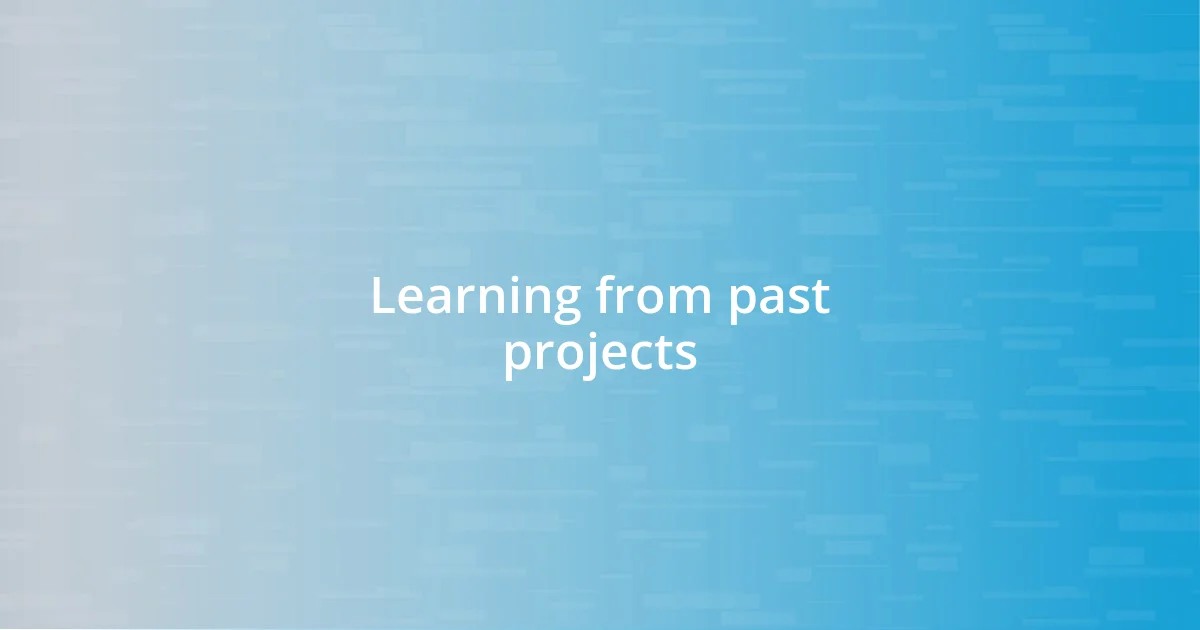
Learning from past projects
Reflecting on past projects is a treasure trove of inspiration. I often look back at some of my earlier endeavors, especially the ones that didn’t go as planned, and I realize how much they taught me. For instance, I once launched a website that totally flopped because I underestimated the importance of user feedback. Have you ever had a project that flopped unexpectedly? It can be disheartening, but those moments teach us about the audience’s needs far more than any success could.
Each project’s journey creates a unique map of lessons to navigate. I keep a journal with detailed notes on what worked and what didn’t, and I refer to it often. While working on a graphic design project, I initially resisted feedback, only to realize later how collaborative input could have elevated my work. Isn’t it interesting how pride can blind us from recognizing the value in others’ perspectives?
Furthermore, assessing my past successes also fuels my creativity. I think about a photography project that gained a lot of recognition simply because I stepped out of my comfort zone. That experience reminded me that embracing risk often leads to the best rewards. What past project made you feel invincible, leaving you with a desire to chase that high again? Learning from both triumphs and trials shapes our approach to future projects in ways we often underestimate.
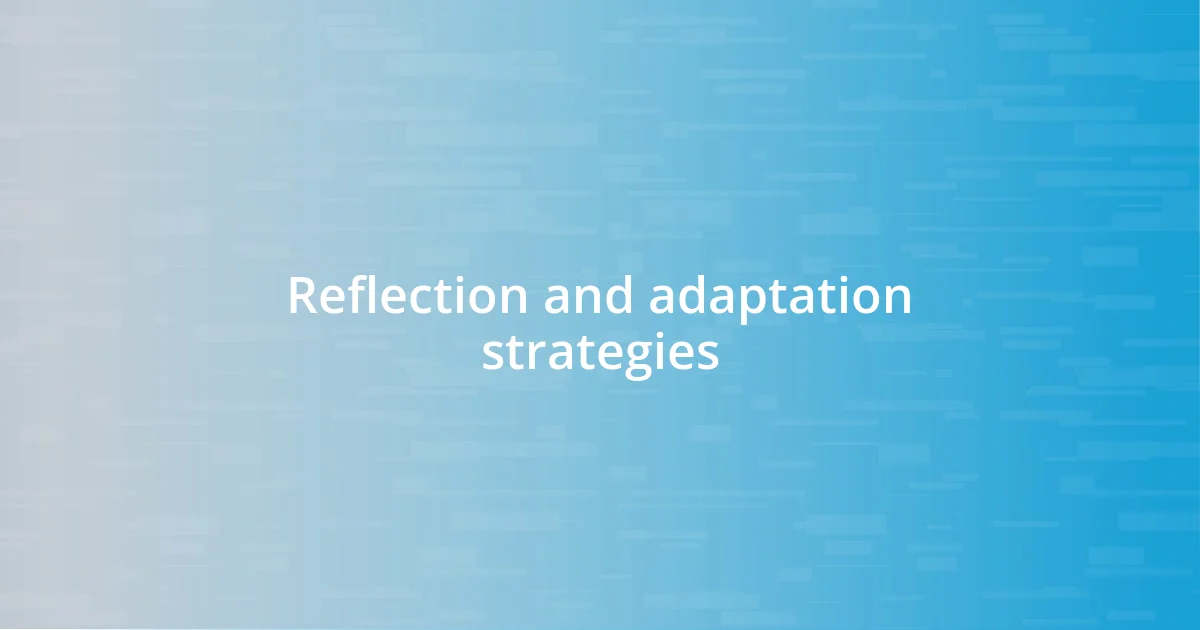
Reflection and adaptation strategies
Reflecting on my creative journey has often been like peering into a mirror, revealing not just who I was but who I can become. I recall a time when I was overly ambitious with a graphic novel idea; I threw together characters and plotlines, but the end result felt disjointed and chaotic. In those moments of disappointment, I’ve learned to pause and evaluate my process. What if I approached my projects as learning experiences instead of just striving for perfection? That shift in perspective opens the door to so much growth.
Adapting based on my reflections has been pivotal for my progression. After completing a short film that didn’t resonate as I hoped, I took the time to dissect every feedback I received. This led me to discover some fundamental storytelling flaws that I had overlooked initially. By embracing constructive criticism, I not only honed my storytelling skills but also transformed my approach to subsequent projects. Have you ever taken a hard look at feedback, only to find it’s the key to unlocking your potential?
Additionally, incorporating flexibility into my creative process has proven invaluable. When I decided to switch my initial theme for a painting that just wasn’t working, it felt daunting. Yet, when I let that creative spirit guide me into uncharted territory, I produced a piece that captivated viewers far more than my original concept ever could. Isn’t it fascinating how sometimes, the best outcomes come from being willing to let go of our first ideas? Adapting to the ebb and flow of inspiration is essential in my creative toolkit.

